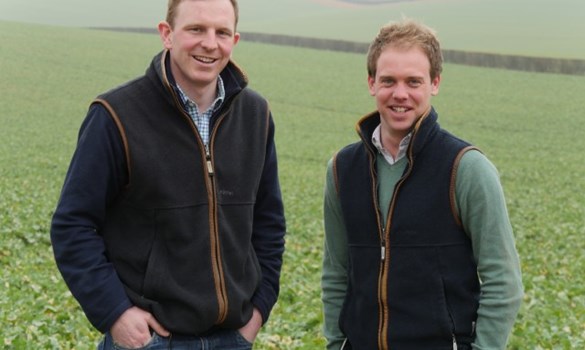Spring cropping and the supply chain: Duxford
As we look forward to the season ahead, join us for a discussion on how to make the most of your spring cropping this year and get more value from the supply chain – thinking about the customer and the end product.
Brin Hughes, Agronomy Manager at Richardsons, will talk us through how to make the most from your oat crop and the specifications of the industry for this useful break crop.
Peter Smith, Agrii, will then discuss the options available to link through to the supply chain, for example with Tiffany Beans and Explorer Barley. How do you make the most of these options and what value does it bring to all across the sector.
What return can be expected on these crops? James Webster, AHDB, will talk through the spring crop gross margins for the sector.
How does all this work in practice? Discuss with David Hurst and Tom Mead to see how it might fit with your rotations and businesses going forwards.
About the Monitor Farm
Tom Mead and David Hurst are hosting the Duxford Monitor Farm together. They farm within nine miles of each other at the Hertfordshire/ Cambridgeshire border and their land is joined by the old Icknield Way. With different businesses but common goals and problems, the jointly-hosted Monitor Farm will provide an opportunity to look at collaboration, farm management and business resilience from two different perspectives.
Tom Mead is a partner at Bleak House Farm in Cambridgeshire. The family farm has 377ha of arable cropping, growing wheat, barley, oats and oilseed rape, as well as sugar beet. They use a mixture of ploughing and minimal tillage cultivation, aiming to cultivate as shallow as possible when the conditions allow. The farm has storage capacity for around 2,000 tonnes. Winter barley and OSR are generally sold at harvest and wheat and oats are stored longer and marketed between harvest and the following spring. Tom is a graduate of the Tesco Future Farmers programme and is particularly interested in running an efficient farm business on a small scale. He also wants to find ways to push the business forward, looking in detail at soils, how to stay profitable, focus on the customer and maintain a good work-life balance.
David Hurst is the arable manager at Law Farming in Hertfordshire. He manages 1,355ha of arable cropping including rye, wheat, barley, oats, spring barley, forage rape, spring mustard and sugar beet. The farm also has a 1,750 head sheep flock, rents land out for pigs and there are plans to introduce cattle back on to the farm. There are three full-time staff and a harvest student. The farm is ploughed for grass leys and winter and spring barley, but a one pass operation is used elsewhere. David’s ambition for the business in the short term is to continue to reduce fixed and variable costs, without affecting productivity or the quality or value of output. During the Monitor Farm programme, David is looking forward to learning from other farmers and wider industries across the supply chain.
Unless otherwise specified, winter meetings will start at
For more information or to attend a meeting, contact Teresa Meadows, AHDB Cereals & Oilseeds Knowledge Exchange Manager for East Anglia on teresa.meadows@ahdb.org.uk or 07387 015465


